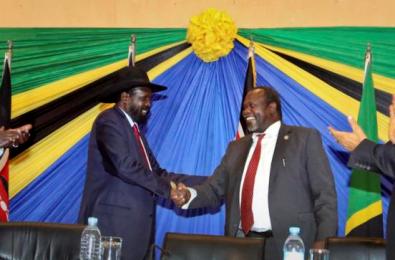S. Sudan’s Kiir signs final peace accord
August 26, 2015 (JUBA) – The South Sudanese president, Salva Kiir has finally signed the long-awaited internationally backed and regional brokered peace deal, raising hopes of possible end to the 20-month old conflict in the world’s youngest nation.

He said he accepted to sign the deal because they were faced with the option of either rejecting peace or accepting war to continue against the will of the South Sudanese.
The South Sudanese leader, however accused forces loyal to former vice-president and armed opposition leader, Riek Machar of allegedly attacking government forces just hours prior to Wednesday’s signing of the agreement before regional leaders.
“As we have gathered here, the spoilers of peace have just launched an attack on the position of our forces in Bentiu and in Nhialdiu. They did this afternoon. You can now see who is for peace and who is for continuous war”, Kiir said in the capital, Juba.
“We will sign this document, but I want you regional leaders to stand with us during the implementation because if it is left to us alone, we will spoil it”, he added, warning that some provisions in the accord should not be ignored for a just and durable peace.
“If our reservations are ignored, it will not be in the interest of a just peace,” said Kiir.
INTERNATIONAL PRESSURE WAS KEY
The Enough Project, in a statement published Wednesday, welcomed the signing by the South Sudan president of a peace agreement to end the civil war that has resulted in tens of thousands of deaths since the conflict began in December 2013.
John Prendergast, the founding director of the Enough Project said concerted pressure from neighboring governments and the broader international community was instrumental in convincing Kiir to sign the deal after missing the 17 August deadline.
“President [Barrack] Obama’s direct engagement with regional leaders during his trip to Africa in late July was essential in cultivating what had been missing so far in the negotiations — international leverage aimed at pressuring the warring parties towards peace,” Prendergast said in a statement extended to Sudan Tribune.
“The successful implementation of the agreement also depends largely on ending impunity for economic and atrocity crimes. The U.S., UK, and other partners should pursue global efforts to trace, seize, freeze, and return the proceeds of corruption back to the people of South Sudan,” he further stressed, adding, “Those that profit from the war should not be able to do so with impunity, even if a peace agreement is signed.”
Justine Fleischner, an analyst with Enough Project, said “The compromise agreement does not resolve the multiple crises facing South Sudan on issues of governance, security, accountability, and economic development, but rather provides a starting point for the parties to come back together and get down to the business of rebuilding their war-torn nation. Only by putting the interests of their people ahead of their own self-interests may peace prevail in South Sudan.”
END TO MASSIVE SUFFERING
Amnesty International said the signing of the peace deal by government was an important and vital step in ending the violence and addressing the massive human suffering in the nation.
The campaign group reiterated calls for both parties to embrace an unequivocal commitment to accountability for atrocities committed during the conflict to ensure a lasting peace.
“Both sides must uphold the terms of the peace deal in order to ensure that immediate steps are taken to bring those responsible for crimes under international law to trial and provide full reparations to victims,” said Sarah Jackson, Amnesty International’s deputy regional director for East Africa, the Horn and the Great Lakes.
“Silencing the guns and signing accords is not enough, if South Sudan is really committed to ushering in a new era of peace and accountability, the international community must remain vigilant and take concrete steps to ensure accountability”, she added.
The United Nations Security Council, African Union and South Sudan’s neighbours, Jackson stressed, have crucial roles to play to ensure mechanisms established during the peace process are successfully implemented to bring perpetrators to justice.
(ST)
